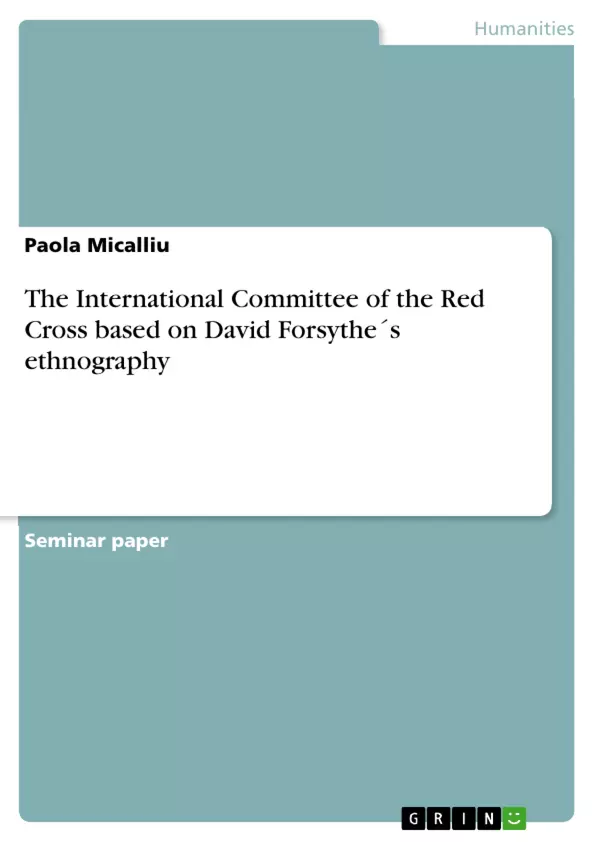In this academic report I deal with the International Committee of the Red Cross (hereinafter abbreviated as ICRC) by using the literature "The Humanitarians - The International Committee of the Red Cross" by David Forsythe and his ethnography recorded there not only to introduce the ICRC, but especially to address a research question.
The focus of the author with his ethnography of the ICRC is on the political decisions and the work of the ICRC on the ground and does not leave out international humanitarian law. The question that arises is how the IRCR exercises its independence, impartiality, and neutrality to try to protect detainees, displaced and starving civilians, and families separated by conflict.
After a brief presentation of the ICRC in this introduction, the argument presented along with its ethnography form the main body of this thesis and consist of a source-based examination of both the ethos and dynamics of the ICRC. Using their values and work, a critical discussion can then be conducted that relates to the research question. A conclusion rounds off the thesis and provides additional concluding remarks also in relation to anthropological work.
Inhaltsverzeichnis (Table of Contents)
- Introduction
- Argument and ethnography
- Ethos: The Red Cross principles and their purpose
- Dynamics: Their work and dilemmas
- Discussion: Critical view
- Conclusion
Zielsetzung und Themenschwerpunkte (Objectives and Key Themes)
This academic paper analyzes the International Committee of the Red Cross (ICRC) based on David Forsythe's ethnography in his work "The Humanitarians - The International Committee of the Red Cross." The paper aims to explore how the ICRC exercises its independence, impartiality, and neutrality to protect detainees, displaced and starving civilians, and families separated by conflict. The paper also examines the ICRC's ethos and dynamics, highlighting its core principles and potential controversies.
- The ICRC's core principles of impartiality, neutrality, and independence
- The ICRC's operational practices and dilemmas in conflict zones
- The effectiveness of the ICRC's humanitarian work
- The ICRC's role in international humanitarian law
- The ICRC's relationship with other humanitarian organizations and national governments
Zusammenfassung der Kapitel (Chapter Summaries)
- Introduction: This section provides an overview of the ICRC and its history, highlighting its role as a coordinator for the world's largest private aid system for conflict situations. It also introduces the research question of how the ICRC exercises its independence, impartiality, and neutrality to protect those affected by conflict.
- Argument and Ethnography: This chapter delves into the ICRC's ethos and dynamics, examining its principles and potential controversies. It explores the Red Cross principles, particularly impartiality, neutrality, and independence, and their role in guiding the organization's humanitarian protection efforts.
Schlüsselwörter (Keywords)
The main keywords and focus topics of this paper include the International Committee of the Red Cross, humanitarian aid, conflict situations, impartiality, neutrality, independence, ethnography, international humanitarian law, and humanization of war.
- Arbeit zitieren
- Paola Micalliu (Autor:in), 2022, The International Committee of the Red Cross based on David Forsythe´s ethnography, München, GRIN Verlag, https://www.grin.com/document/1436696



